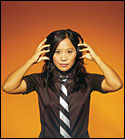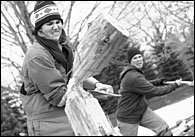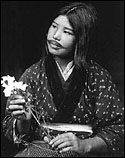On Campus
CUP runneth all over Montreal
 "Definitely Not the Opera" host Sook Yin Lee will be speaking at the CUP conference
"Definitely Not the Opera" host Sook Yin Lee will be speaking at the CUP conferencePHOTO COURTESY CBC |
|
For some people, the cup is half full. For others, it is half empty. But from January 22 until January 27, CUP is in Montreal, and for the first time in its 65-year history, it will be half French.
CUP is Canadian University Press, a cooperative organization of college and university newspapers from St. John's to Vancouver. Once a year 200 aspiring Wooodwards, Fotheringhams and Hunter S. Thompsons congregate in one city for the annual national conference.
"It's where people who write, edit and put out a student newspaper all meet each other, network, and learn how to do a better job," said coordinator Ira Dubinsky, a McGill political science student.
Dubinsky is a veteran of CUP-cons -- this will be his fifth. The upcoming conference -- co-hosted by the McGill Daily and the Concordia Link -- will be one of the best yet.
Keynote addresses will be given by ex-Much Music VJ and current "Definitely Not the Opera" host Sook Yin Lee, MacLean's editor-in-chief Anthony Wilson-Smith, and Heritage Minister Sheila Copps, among other notables.
Dubinsky explained that CUP conferences have a mix of seminars on "hands on" journalism, advice on more general topics from professionals in the field and more academic seminars on topics like queer coverage in the media. Seminars will be given by professors from Concordia and McGill, as well as professionals from The Gazette, the Hour and The Globe and Mail.
In keeping with the nature of the locale, and thanks to a grant from the provincial government, much of this year's conference will be bilingual, with many seminars in French or with simultaneous translation. In fact the conference is being held with cooperation from Presse universitaire indépendante du Québec -- a first for both organizations.
"It's a new era of cooperation between the French language student press and the English language student press," said Dubinsky.
CUP seminars and keynote speakers are open to the public. All events will be at the Crown Plaza Hotel, 505 Sherbrooke East. For a detailed schedule and fees, check out www.cup.ca/point or call (514) 773-8007.
2002 Woodsmen Competition
Hacking their way to glory
 2002 Woodsmen competition
2002 Woodsmen competitionPHOTO: Owen Egan |
|
Hack! Hrrrugnh! Metal flashes in the sun. An axe whistles in the air.
With all the grunting, running and chopping going on at, you'd think you were at a Lord of the Rings battle scene. Nope. It's time for the 49th Annual Woodsmen Competi-tion!
More than 40 teams of lumberjacks and lumberjills from across Canada and the U.S. will compete January 25 at Macdonald Campus's Centennial field, from the rosy hour of 8:00 am until the sun starts to wane at 4:00 pm.
Poles will be climbed, and wood will be chopped, sliced, and chipped in more ways than you ever dreamed imaginable. The race to see who can boil a can of water the fastest (with an only an axe, a log and three matches), is thrilling. The fastest time ever is just under two minutes, quicker than your home stove.
From buck sawing to axe hurling, water boiling to balancing on logs, timbersport athletes will prove their mettle in a wide range of skill-testing activities. McGill's female woodsmen team will try to keep their top-ranked status -- they've won the past 18 competitions. The men's team is looking brawny and speedy this year, and they plan to win the championship.
For an account of last year's event, see www.mcgill.ca/reporter/34/10/woodsmen. For more information, call 398-7789. Go and prepare to be stupefied. Just stand back from the chainsaws, okay?

Sacrilege or art?
Fanciful folios
When Paule Samson-Finidori curls up with a nice thick paperback it isn't necessarily to read it. She instead meticulously folds each page, one by one, creating a rare art she has dubbed "papliés" (from "pages pliés").
Samson-Finidori, an administrator for the Department of French Languages and Literature, could fetch hundreds of dollars for her biblio-sculptures, but she prefers to raise awareness of the department through promoting her work.
The books expose their pages in a way that subverts their regular function. No longer readable, they are mute, but evoke volumes. When people first see the elegant accordion-like works, some cry sabotage -- "You can't do that to a book!" Samson-Finidori explains that instead of destroying the paperbacks, she's giving them a second life by rescuing tomes destined for the recycling bin at best.
Samson-Finidori has contacted another woman who does similar work, Brig Laugier in France. Laugier has gotten flack for folding 18th century books. A crime? Less so than the libraries that had slated them for the shredders. Her next project is to fold an entire set of Encyclopaedia Britannicas.
Samson-Finidori is also from France, the town of Coulommiers, an hour from Paris. By coincidence, she grew up with the stench of pulp mills in her nose and the sound of book commerce. Her hometown is one of France's major book-producing centres.
You can view these curious artworks in Peterson Hall's display case until February 6. The space is usually reserved for books by professors (just as unreadable, some say).
The vernissage for the exhibition will be next Wednesday at 5:00 pm. Expect more than just a plastic cup with plonk, according to Samson Finidori. She plans on offering something special.
Pli sur pli, mot contre mot, exposition des Papliés (sculptures-pliures) de Paule Samson-Finidori, Jan. 7 -- Feb. 6, Peterson Hall, 3460 McTavish. Vernissage: Jan 22, at 5:00 pm. The exhibit will then move to the Bibliothèque de Ville Mont-Royal, 1967 Graham Blvd., Feb. 7 -- March 6.
Women's world
 Ainu woman sporting a traditional tattoo
Ainu woman sporting a traditional tattoo |
|
It isn't every lecture series that will take you from Japan to Mexico, from literature to economics all in one semester. That is the special challenge of presenting a seminar series for an interdisciplinary field like Women's Studies, explains Shree Mulay, director of the McGill Centre for the Research and Teaching on Women (MCRTW).
The theme for this series is "Gender, Power and Social Change."
"We had a brainstorming meeting, where we sat down and thought about the kind of research we do at McGill in the area of women's studies. Is there a common theme? People in women's studies do work in law, in education or in medicine. But there is an undercurrent to finding ways to look at gender," explained Mulay.
"We thought it was important to connect them thematically. When you have presentations by people with different themes, you don't see the linkages between the different kinds of research that goes on in the area of women's studies."
The first two lectures in the series, today and next Thursday, show the breadth of topics: "Gender Technology and the Destruction of Librarianship," the next is "The Resistance Literature of Ainu Women of Northern Japan." Other seminars examine topics as diverse as Arab/African American poetry, gendered violence on the U.S./Mexico border and French second-language delivery to South Asian immigrant and refugee women in Montreal.
The series also incorporates the teaching mission of the MCRTW.
"We have our seminar speakers visit our introductory course. This was the first year that we tried this and it has been extremely successful -- the feedback has been overwhelmingly positive," said Mulay.
"We also have a colloquium course for honours students," she said. The students are required to "attend the seminars and write reports and critique at least 50 percent of the seminars and be able to integrate that into their thesis work."
"Gender, Technology and the Destruction of Librarianship" Arts Building, Rm 130, January 16, 4 pm.
"The Resistance Literature of Ainu Women of Northern Japan," Arts Building, Rm 160, January 23, 4 pm.
For more information on upcoming MCRTW seminars, contact Cy-Thea Sand, 398-2006, cy-thea.sand@mcgill.ca

